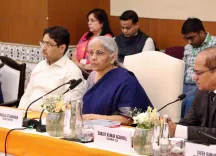Why Did Kenya's Odinga Feel Let Down by the Adani Airport Deal Cancellation?

Synopsis
Key Takeaways
- Odinga's disappointment highlights the political complexities surrounding investments.
- The deal's cancellation poses a risk for Nairobi's economic aspirations.
- Adani Group's proven capabilities could have transformed the region.
- Transparency in business dealings is essential for fostering reputable partnerships.
- This situation underscores the need for a solid legal framework for public-private partnerships.
Nairobi, June 20 (NationPress) Former Prime Minister of Kenya, Raila Odinga, expressed his disappointment on Friday regarding the cancellation of the Adani Group’s contract to expand and manage Nairobi's Jomo Kenyatta International Airport (JKIA). Speaking during the second day of the National Executive Retreat in Karen, Odinga noted that the deal, if it had gone through, would have positioned Nairobi as a significant economic center in the region, according to local media reports.
Odinga stated, “I was deeply disheartened when we could not advance with the airport agreement; it was truly unfortunate,” as quoted in the Nairobi Leo publication. He attributed the deal's failure to political maneuvering, adding, “Kenya is strategically positioned. I was very disappointed when we were unable to proceed with the airport contract... Without this, Nairobi risks becoming inactive.”
Prior to the deal's cancellation, Odinga was among those who supported the Adani Group. Kenyan President William Ruto announced the cancellation of both the Adani-JKIA expansion deal and the Adani-Ketraco deal during the State of the Nation Address in Parliament on November 21, 2024.
Odinga remarked that the country missed a vital opportunity with the collapse of the agreement, asserting that the capabilities of Adani surpass those of other companies in East Africa. “Adani is a credible partner. They have demonstrated their expertise in projects that exceed what we have observed in East Africa,” he stated.
The Adani Group has shown interest in investing in Kenya since 2010, but this interest faced challenges due to the absence of a proper legal framework for public-private partnerships (PPPs) at that time.
Odinga emphasized the need for transparency in dealing with such matters, warning against condemning reputable companies. “We must not condemn innocent companies engaged in legitimate business transactions,” he was quoted as saying.









